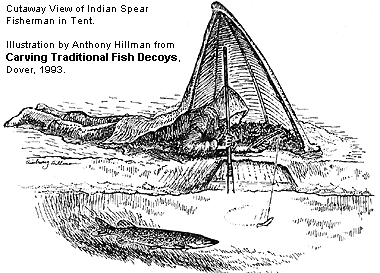From time to time I come across interesting examples of old spearfishing or spearing practices.
From Lee Valley Tools - How to Make a Traditional Folk Art Ice Spearfishing Decoy

Spearfishing decoys have been used by native ice fishermen for thousands of years and were copied by our pioneer ancestors, primarily as a method of providing essential winter table food. Eventually, this method developed into large commercial fishing activities. After the turn of this century, spearfishing was banned in Canada, but is still legal in six of the United States. In most cases, a very small fish hut (or shanty) was used to protect the fishermen from the icy winter blasts on the lakes and rivers and to allow better viewing into the watery depths below.
USE: Secured by a short jigging stick and line, the weighted decoy was lowered to the desired depth through a hole cut in the ice. Gently raising and lowering the stick caused the decoy to circle and glide, which in turn attracted the fish. Because the decoy had no hooks, the alert fisherman used a long spear to seize the fish.

